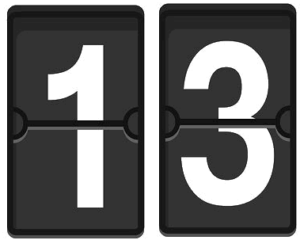 Most people are superstitious to some extent. Even those that don’t believe that they are will still say ‘touch wood’ when describing a possible outcome of an event or ‘jinx’ when they say the same thing as someone else at the same time. It can be an amusing affectation or something to laugh about with someone, but for some people those superstitions can be taken extremely seriously. They can begin to influence how they approach certain events or how they go about placing their bets on sporting outcomes.
Most people are superstitious to some extent. Even those that don’t believe that they are will still say ‘touch wood’ when describing a possible outcome of an event or ‘jinx’ when they say the same thing as someone else at the same time. It can be an amusing affectation or something to laugh about with someone, but for some people those superstitions can be taken extremely seriously. They can begin to influence how they approach certain events or how they go about placing their bets on sporting outcomes.
Whilst it can be an amusing and sometimes fascinating side of sport, when it begins to influence the manner in which people place bets, it is noteworthy. There are some that might perform better because of their superstitions, but this is usually sheer coincidence. Most of the time, people who allow rituals or superstitions to influence their betting will find that they perform much worse than those that do not. Consequently, it’s crucial that we know what our own quirks and betting patters are and work to avoid them.
Why We Have Rituals & Superstitions
 An in-depth article looking at rituals and superstitions would run on for hundreds of pages. Indeed, there have been case studies carried out on them and their influence over gamblers that were subject to them. What we want to look at here is why people have superstitions at all, but to do so in a brief manner rather than to explore in as a dissertation. Studies show that around a quarter of all adults in the United Kingdom are actively superstitious, but why do they engage in such thinking?
An in-depth article looking at rituals and superstitions would run on for hundreds of pages. Indeed, there have been case studies carried out on them and their influence over gamblers that were subject to them. What we want to look at here is why people have superstitions at all, but to do so in a brief manner rather than to explore in as a dissertation. Studies show that around a quarter of all adults in the United Kingdom are actively superstitious, but why do they engage in such thinking?
A superstition is a belief that things are influenced by ‘magic, chance or divine fortune’. They are typically engaged in in order to avoid a bad outcome or to encourage a good one and typically tend to see people abdicate responsibility to a higher power. This isn’t necessarily a god or deity, but rather something as simple as ‘nature’. There is, according to the superstitious, a mysterious force that can lead to either success or failure influencing our lives as a matter of complete fortune, rather than hard work.
This is something that has existed for millennia, coming in the shape of ‘Lady Luck’ or the ‘Wheel of Fortune’. The use of charms, rites and rituals has existed throughout human history. These will often come into play during times when people feel adversity or when their situation is uncertain. There are few things as deliberately uncertain as bets, with neither those placing them nor those taking them knowing with certainty what the outcome will be, even if we can all have a sense of how things are going to pan out sometimes.
In many ways, rituals and superstitions are a way of trying to take back control when control isn’t there to be had. We have no way of controlling the outcome of a football match, for example, but if we cross our fingers or wear our lucky pants then it at least feels as though we’re doing something. We want to try to impose a sense of control on any situation that we find ourselves in, which is precisely what superstitions and rituals allow us to do. It doesn’t actually make a difference, but we feel like it might so we do it anyway.
Superstitions And Betting
 It will hardly be a surprise to people that enjoy sports to learn that superstitions play a big part in them. Anyone that ever watched Rafael Nadal repeatedly pick his underwear out of his bottom before returning a serve in a tennis match, or saw Mohamed Salah drop to his knees and issue a prayer after scoring a goal will be used to the idea of superstitions and sport. Just as with superstitions in any other form of life, it is an attempt to gain a sense of control over something that someone has very little control of.
It will hardly be a surprise to people that enjoy sports to learn that superstitions play a big part in them. Anyone that ever watched Rafael Nadal repeatedly pick his underwear out of his bottom before returning a serve in a tennis match, or saw Mohamed Salah drop to his knees and issue a prayer after scoring a goal will be used to the idea of superstitions and sport. Just as with superstitions in any other form of life, it is an attempt to gain a sense of control over something that someone has very little control of.
Of course, for sports people it is slightly different because they are, at least, taking part in the match or event in question and can therefore influence its outcome in at least some respect. They can’t necessarily influence whether they pick up a fluke injury or whether another player or team performs better than them, but they can influence their own performance. As a result, obeying certain rituals and superstitions makes sense to them because it allows them to feel even more in control than they would otherwise be.
In betting, the same principle applies. None of us is able to influence the outcome of a sporting event, bar cheering and supporting those taking part when we’re attending in person. Our shouts and cheers might help to contribute to the performance of one player, just as our jeers might cause another to underperform. Given that those physically in attendance is just a fraction of the number of people that will watch, bet on or generally care about an event in one way or another, however, it’s generally quite negligible.
As a result, we look to find ways to influence one of two things with our superstitions: the outcome of the event or the bet that we’re placing. Perhaps you’re the sort of person that likes to bet on horse racing and often tend to narrow your choice down to two different horses. Rather than pick one, you toss a coin, assigning a value to each horse before doing so. This ritual has led to you picking a winner in the past, reinforcing the idea that it actually makes a difference to the success of your bet, so you keep on doing it.
The problem is, the reason it worked last time was that you’d correctly identified one of the better horses taking part in the race and then it was pure chance that the coin landed in a way that saw you place your bet on the ‘winning’ horse. It didn’t work the next time you did it because neither of the horses that you narrowed it down to were ever likely to be successful, so the coin couldn’t have helped even if it was able to. The superstitions can lead to your decision making being poor, which is exactly what we want to avoid.
Influencing Our Belief We Will Win
 By assigning power to a ritual or superstition that it doesn’t deserve, we put ourselves in a position whereby we can believe that we’re more likely to win than we actually are. This, in turn, might well lead to us doing less research than we would normally do because we abdicate responsibility of the success or otherwise of our wagers to our beliefs. Equally, we can believe that something is less likely to happen because we did not carry out our ritual correctly, influencing things for the worse rather than for the better.
By assigning power to a ritual or superstition that it doesn’t deserve, we put ourselves in a position whereby we can believe that we’re more likely to win than we actually are. This, in turn, might well lead to us doing less research than we would normally do because we abdicate responsibility of the success or otherwise of our wagers to our beliefs. Equally, we can believe that something is less likely to happen because we did not carry out our ritual correctly, influencing things for the worse rather than for the better.
When our beliefs are influenced by something that is false, such as a superstition, the outcome will often not be what we want it to be. Consequently, we should ignore all such things and carry out sensible decision making, but we don’t. Instead, we enslave ourselves to our superstitions and rituals, gaining a false sense of confidence in our betting because of them. When bets are based on belief rather fact, we will lose in the long-run, which goes entirely against what we’re trying to achieve with our betting choices.
The Link Between Superstitions & Problem Gambling
 There is, according to the research, a strong tie between superstitious behaviour and problem gambling. By introducing something that makes us feel as if we have control into a world in which we have no control, we can begin to think that maybe we’re having an influence on the outcome of events. This, in turn, means that when things don’t go our way then it isn’t because of luck or misfortune but simply because we didn’t carry out the ritual correctly, didn’t do what was right regarding the superstition and need to try again.
There is, according to the research, a strong tie between superstitious behaviour and problem gambling. By introducing something that makes us feel as if we have control into a world in which we have no control, we can begin to think that maybe we’re having an influence on the outcome of events. This, in turn, means that when things don’t go our way then it isn’t because of luck or misfortune but simply because we didn’t carry out the ritual correctly, didn’t do what was right regarding the superstition and need to try again.
Surely when you do it next time you’ll be able to make sure that you succeed? That’s the thinking of someone who who is superstitious and it’s why they can be so prone to falling foul of problem gambling issues. They gamble repeatedly, hoping that this time they will get their ritual correct and it will have the influence on the outcome that they hope for. Whilst athletes are also prone to falling foul of superstitions, such as walking onto the field of play backwards, the big difference is that they can actually influence the outcome.
A bettor cannot influence the outcome of an event that they have placed a bet on by wearing their ‘lucky’ t-shirt or holding a rabbit’s foot when they place their bets. They still do it, however, because they hope that it will prove to be influential. If they win their bet, they did their ritual correctly, whilst if they don’t then it can be put down to the superstition rather than the fact that it was a poor bet to place to begin with. This is the issue that problem gamblers face and the reason so many struggle to break their patters.
Avoiding Falling Foul Of Superstitions
 Superstitions are based entirely on falsehoods. This is a simple fact. Those that believe wholeheartedly in them will disagree, but there is no scientific basis that suggests that superstitions and rituals make any actual difference to an outcome. This is especially the case when the person engaging in the superstitious belief has no way of influencing the outcome. The first thing that we need to do is accept that this is true and that any link between a superstitious behaviour and previous success is entirely coincidental.
Superstitions are based entirely on falsehoods. This is a simple fact. Those that believe wholeheartedly in them will disagree, but there is no scientific basis that suggests that superstitions and rituals make any actual difference to an outcome. This is especially the case when the person engaging in the superstitious belief has no way of influencing the outcome. The first thing that we need to do is accept that this is true and that any link between a superstitious behaviour and previous success is entirely coincidental.
This alone will make a big difference to our betting decision making for the simple reason that we will stop abdicating responsibility and begin accepting that we alone can decide what our bets should look like. This will allow us to engage in sensible decision making as well as the realisation that we need to put work into our betting decisions. No amount of four-leaved clovers, touching wood or crossing fingers will help us win bets as much as solid and intelligent research into sporting events will do.
Professional gamblers are able to think about what they’re doing dispassionately. They will look at the facts and figures of a particular sport and drill down into the underlying numbers of an event in order to decide how their bet should play out. They will not depend on wearing lucky underpants prior to the start of the Grand National. This is the attitude that everyone needs to adapt to if they hope to avoid falling foul of superstitious behaviour and thereby losing more bets than they’ll win over the long-term of their betting career.
Let’s imagine for a moment that you’re thinking about betting on a Premier League match between Manchester United and Brighton & Hove Albion. Having done your research, you’ve discovered that Brighton have lost their last two matches heading into the game, but they have done so with an Expected Goal total of 7 and an Expected Goals Against of 2, but lost the first match 3-0 and the second one 1-0. United, meanwhile, have had an xG of 1.7 and an xGA of 5.4, but won their matches 1-0 apiece.
The underlying numbers suggest that Brighton will win if they are able to perform to the level that their xG numbers suggest that they can and if Manchester United’s performance returns to the mean. The bookmakers have United as overwhelming favourites, meaning that the smart bettor will put their money on Brighton and be in position to win a decent amount if xG goes their way. The superstitious bettor, on the other hand, has placed their bet on Manchester United and worn their lucky pants.
Of course, it’s more than possible that United will win, but it has nothing to do with the person’s lucky pants and everything to do with the xG not yet reverting to mean. It will do over the course of a season, so the professional bettor that has been following it will stand to win more money by betting in line with xG figures than the person depending on their lucky pants to get them through. Sometimes lucky pants will seem lucky, sometimes they won’t, but on all occasions they are just pants.
